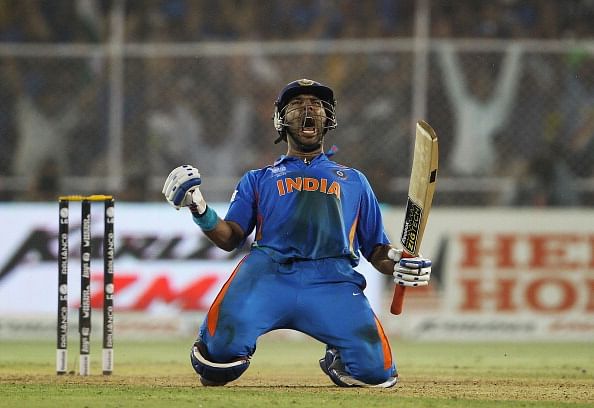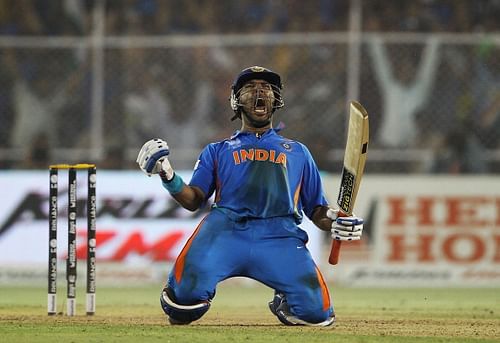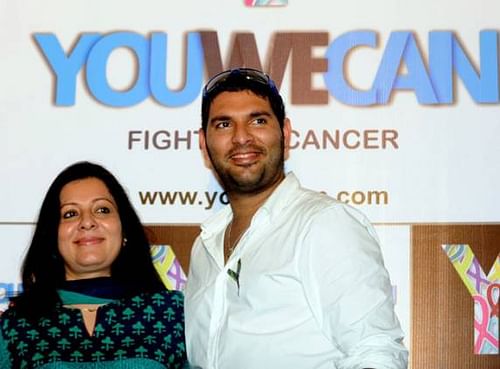
Yuvraj Singh: The journey from a champion to a hero

In sport, perhaps more than in any other profession, we tend to confuse champions for heroes. A hundred centuries, 17 grand slams, even a last ball six in a World Cup victory; we label these as acts of heroism ascending them to the service of our soldiers, fire fighters, of the hundreds of those faceless men who risked their own lives in floods, fires, earthquakes to save those of others. We mistake timely acts of sporting brilliance as acts of courage. Admittedly, there is a demand of courage in going for a cross-court winner when you are facing a formidable serve at match point too, but not the kind that is demanded of a man who chooses to run into a blazing fire to save the life of a stranger, of a man who chooses bravery in the face of mortal termination.
But ever so rarely at the theatre of sport, do we get to see a hero. Maybe not of the pedigree of a wartime soldier, but the closest that this field of life can produce. When Arthur Ashe fought against apartheid at a time when coloured men were treated as an inferior race, that was an act of heroism. Later in his life he would begin a second battle with AIDS and that would still not stop him from fighting against the burden of his race. In fact when once questioned on AIDS, ‘’Is this the hardest thing you’ve ever had to deal with?’ he said, ‘No, the hardest thing I’ve ever had to deal with is being a black man in this society.” When Terry Fox, Canadian basketball player and a long distance runner, with one leg amputated due to cancer embarked on a cross Canada run to raise money and awareness for Cancer research as early as 1980, he became a hero. The disease would eventually claim his life, but not before his Marathon of Hope made a difference to the way cancer was dealt with in that country. Heroism is essentially linked with selfness, the ability to electing to live with a human purpose when a choice of personal comfort is right at hand. Today, we might be at the brink of adding one of our own to these ranks of sporting heroes and as an Indian, I take pride.
I am not saying Yuvraj Singh belongs alongside the likes of Arthur Ashe or Terry Fox, not yet, but am only pointing to the fact that he has done nothing to suggest otherwise. He would often wake up in the nights during the World Cup, coughing blood, unable to breathe, and yet refused to shy away from the challenge. He gave his best on the field, and quite deservedly turned out to be the best player of the tournament. Even after the diagnosis, he had a choice to go into a state of denial, become a prisoner of his own self, surround himself with sympathizers, people who would say things like, ‘How could this happen to you, you were such a nice person’ (as if cancer happens to bad people) like most patients do. Yet he chose to fight, sent us pictures of him recovering, and maintained from the very beginning that he still wanted to play cricket for India. He refused to play the victim. After a complete recovery, which itself ensued only after a courageous battle against the disease, we perhaps still wouldn’t be discussing him today if he hadn’t found the will to come back to the sport at its biggest stage.
In a country where emotion is seldom divorced from sport, his selection for the T20 World Cup was perhaps based more in sentiment than in logic. It was questioned of course; Ravi Shastri for instance went on record saying “When it comes to India versus Pakistan, I’m not the kind to get emotional. He’s still rusty and he’s still a bit slow.” And in that very match, he came on to bowl in the seventh over and struck twice in quick succession to leave Pakistan tottering at 49 for four. After making a couple of diving saves early in the innings, he even claimed a late run-out with a direct hit from cover, and then crunched a couple of elegant boundaries before hitting the winning run with three overs to spare. There are far too many sporting comebacks that die in the corners of a sports page, this wasn’t one of those. He was on that day, the personification of Kelly Clarkson’s wonderful lyrics:
What doesn’t kill you makes you stronger
Stand a little taller…
What doesn’t kill you makes a fighter
Footsteps even lighter…
A World Cup, a battle and another World Cup later, he finds himself in a unique position. His sheer presence on the cricket field, now a tribute to what human will can achieve, will tug at the hearts of millions of men. He will be more than the flurry of those six consecutive sixes off a distraught bowler, more than the ‘Man of the Tournament’ award at this sports biggest competition, more than every run that he has ever scored, every wicket that he has ever taken. He now has the power to make a difference to the lives of real people, not just the scoreboard. Arthur Ashe saw heroism as “not the urge to surpass all others at whatever cost, but the urge to serve others at whatever cost.” Gifted now with a second bout and a fresh perspective, it is this phase of his life and it’s resemblance to Ashe’s wonderful words, that will define the hero that he can be.

And so far, I am delighted with what I have seen. Earlier in July, he launched a cancer awareness program called YouWeCan, was pictured playing cricket with kids and on more than a couple of occasions spoke out for his fellow cancer victims “In the coming time, I will definitely do something for people with cancer; patients struggling with cancer are like a family to me. I can understand their pain and I feel more connected to anyone who is going through it.”
Here’s wishing the hero a glorious journey, to infinity and beyond.